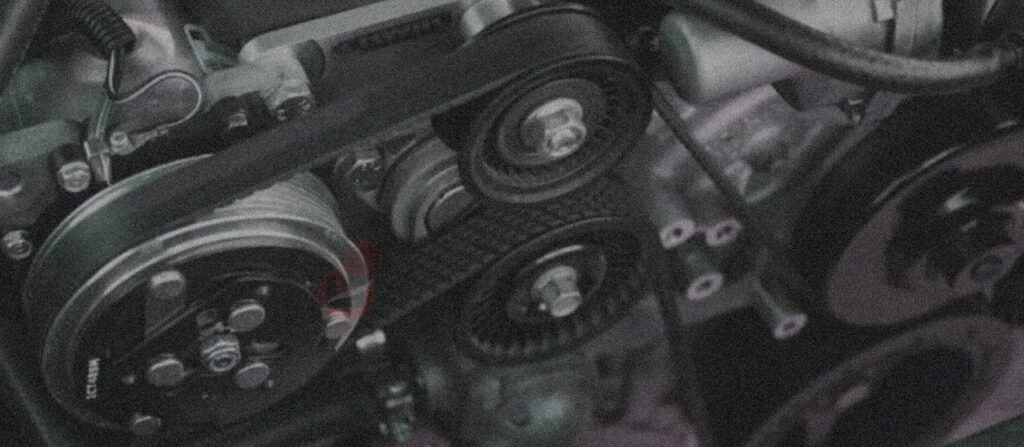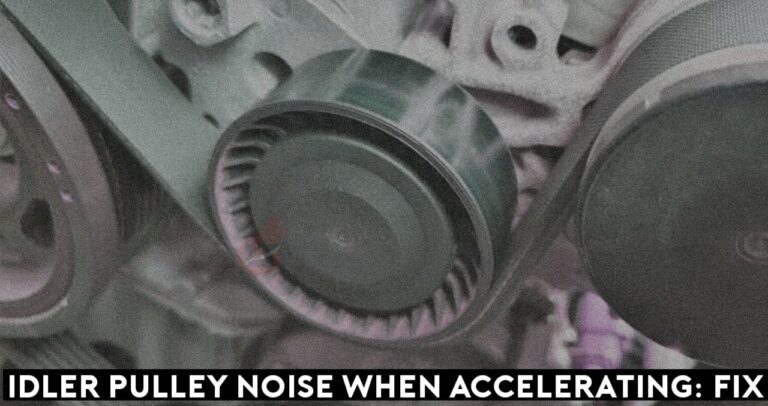By default, the idler pulley operates quietly, but when it starts making an unpleasant noise when accelerating, it should be cause for concern.
In our previous article, we learned that the role of the idler pulley is to maintain proper belt tension and smooth power transmission within the engine system. However, this pulley can rust over time and make a whining noise when driving.
In this article, we will explore the function of the idler pulley, the causes of idler pulley noise when accelerating, and an estimated replacement cost.
What is an Idler Pulley?
Let’s understand the function of the idler pulley before we delve into the noise issue.
The idler pulley is a small component within the engine’s accessory belt system. Its primary role is to guide and support the serpentine belt as it drives various engine components, such as the alternator, power steering pump, and air conditioning compressor.
It is designed to maintain tension on the belt to prevent slippage and ensure smooth power delivery.
Causes of Idler Pulley Noise When Accelerating
A Worn-out Pulley bearing, a misaligned or damaged belt, and a damaged pulley are the 3 common causes of an Idler Pulley Noise When driving.
Worn-out Pulley or Pulley Bearing
Over time, the pulley or its bearing may wear out due to exposure to heat and other contaminants.
Once this happens, you will hear a whining or squealing noise when the engine is under load, especially during acceleration.
Misaligned, Worn-out, or Damaged Belt
When the idler pulley is worn-out, it’ll cause the belt to become misaligned, thereby slipping off during acceleration.
Likewise, a worn-out belt can generate noise as it touches the pulley surfaces. Checkout for cracks, frays, or glazing on the belt’s surface to prevent permanent damage.
Similarly, if the belt tension is not adjusted correctly, it can cause excessive friction and noise. This can occur due to a faulty belt tensioner, a loose idler pulley bolt, or a worn-out belt.
Damaged Pulley
If the worn-out pulley isn’t replaced immediately, it may break down in the long run. This damage often causes you to replace the serpentine belt because it’ll also tear it apart.
This scenario can lead to complex issues such as engine overheating, engine stalls, and louder accelerating noises.

Idler Pulley Replacement Cost
The cost of replacing a faulty idler pulley may differ from car to car, but it ranges from $70 to $250. Other factors, such as labor costs, may also hike the replacement cost.
For example, you may be asked to pay $40 for the idler pulley and $30 for labor for a particular vehicle; meanwhile, the replacement on another vehicle will cost you $100 for the idler pulley and $150 for labor.
It all falls on the model of the car you drive, the ease of installation, labor costs, and other taxes that an auto shop might have in place.
FAQs
What are the symptoms of a bad idler pulley?
Some symptoms of a bad idler pulley are engine overheating, whining noise when accelerating, check engine light on, losing power steering control, etc.
Can I drive with a noisy idler pulley?
Yes, driving with a noisy idler pulley for a long time is possible, but it’s risky when it eventually fails. It could cause the belt to slip, resulting in loss of vehicle control, or even tearing the serpentine belt, causing overheating.
Does the idler pulley affect performance?
Yes, the function of an Idler Pulley is to support the serpentine belt as it drives various engine components, such as the alternator, power steering pump, and air conditioning compressor.
What is the difference between an idler pulley and a tensioner?
The major difference between the idler pulley and the tensioner is that the idler pulley guides and supports the serpentine belt. In contrast, the tensioner is responsible for maintaining the correct belt tension.
Similarly, the idler pulley rotates freely and has no spring-loaded mechanism. In contrast, the tensioner has a spring-loaded arm that applies pressure to the belt to keep it properly tensioned.
RESOURCE VIDEOS
As an Amazon Service LLC Program Associate, V. Auto Basics earns from qualifying purchases. See Our Affiliate disclaimer.
